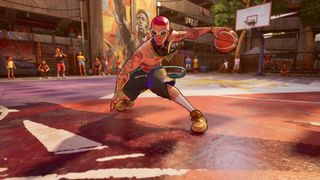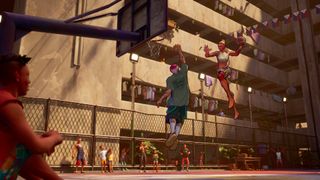Former EA devs are making a 3v3 basketball game without all the 'GM modes and micromanagement and opening packs' of modern pro sports games
The Run: Got Next is an NBA Street-inspired basketball game focused on quick matches with a team of friends.
Each year's slate of new pro sports games comes with a goofy set of new proper nouns to describe their cutting-edge animation and physics systems: Madden introduced "FieldSENSE" a few years ago, for instance, and now Madden NFL 25 promises "FieldSENSE powered by BOOM Tech." You can't make this stuff up, unless you're EA of course, in which case you literally have.
A group of former EA developers have left that technical arms race behind to make a different kind of sports game, one they think has been missing from the scene. Announced today, The Run: Got Next is a 3v3 arcade basketball game with quick matches for our hopelessly corroded attention spans (and no BOOM Tech). And unlike certain other sports games—EA's new college football game comes to mind—it's getting a PC release as a priority.
The NBA Street series is the most obvious point of comparison, and The Run's creative director, Mike Young, worked on all of those games. He was also the Madden NFL creative director for 10 years.
The technical focus that makes modern pro sports games look like TV broadcasts has its place, but has required trade-offs, Young said in a recent interview with PC Gamer. One consequence of procedural animation systems is that they limit the responsiveness of the controls: You can't let players cancel dunks into passes at the last second if every action is motion captured and simulated. Young also says that The Run's defensive play will distinguish it from simulation-focused games, where it's "often just skipped, or it's too complicated, or you don't feel powerful, or it's too realistic." Rather than realism, The Run aims to offer distinctive characters and to generate tension with back-and-forth play—expect loads of blocks.
The big idea here, however, is that EA and 2K's pro sports games have left a void to fill for a social, easy-to-pick-up multiplayer sports game. Young recalls his teenage son playing games like Rocket League and Fortnite while FaceTiming with friends at the start of the pandemic, but even though they all loved the NFL, they'd play Madden by themselves because there wasn't a good way to play together.
Play by Play Studios CEO Scott Probst, who's also ex-EA but not from its sports teams (he worked on games like Dead Space 2 and Battlefield: Hardline as GM at Visceral), says it's in part about offering a sports game that's focused on playing the sport.
"So many of these [pro sports] games have become so complex, there's so many different modes: GM modes and micromanagement and opening packs and all these things that kind of prevent you from getting in and actually enjoying the sport," he said. "And that's been a big focus for us, getting you into playing the game. That's something that Rocket League does fantastic. I can jump in there as a first timer, and I may not be the best player in the world, but I can go in and I can enjoy the sport and I can have a blast. I don't have to go on quests, I don't have to go grind for 1,000 hours before I feel like I'm effective."
The biggest gaming news, reviews and hardware deals
Keep up to date with the most important stories and the best deals, as picked by the PC Gamer team.

There is some structure to The Run, though, which its name hints at. The main way to play will be to go on "a run": a series of games, which are only about four minutes each, that ends when your team of three loses. Each game will take place on a different court with unique modifiers—a Himalayan court where your stamina recharges more slowly, for instance—and there's a metagame where players can modify their characters between games, selecting new abilities. So you get lots of bite-sized matches, but with the possibility of achieving something bigger, a successful run that spans every court. In a blog post, the studio points to roguelike hockey game Tape to Tape as one of its inspirations.
Alongside the console versions, Probst says the studio has been regularly testing The Run on PC, and that there are even players who prefer the keyboard controls (just keyboard, no mouse, interestingly). He also touched on 2K and EA's spotty history with PC sports games.
"I think we saw an opportunity, because a lot of the bigger companies don't specifically pay attention to PC," said Probst. "It often either gets ignored and forgotten, or it gets kind of last-gen features. And for us from the jump it was, we're playtesting twice a week on PC, we're constantly looking at the game on PC and evaluating it on different machines. Because I think for us, we see the potential of the player base that's there, and also, a lot of us are PC gamers."

The Run does sound appealing to me as a 1,000-plus hour Rocket League player, but I always feel a bit of sympathetic nervousness around niche multiplayer launches. It doesn't really seem to matter much how good they are or aren't, or how much marketing is behind them: sometimes they make it, and sometimes they don't. Knockout City was one of our favorite games of 2021, for example, but its official servers are long gone now. (Happily, the devs planned for that eventuality and released the tools players need to run their own servers.)
Probst isn't naive to the difficulty of launching and maintaining a successful multiplayer game, and was a fan of Knockout City himself. If The Run isn't an instant success, there's "enough runway to sustain the company" after launch, he says. The Run won't be a free-to-play game, and Play by Play is a small studio, which Probst says allows them to be successful without having to pull in the kind of enormous player base that sustains free-to-play games.
No firm release date has been announced for The Run: Got Next yet, but the plan is to release it next year—on PC, it's on Steam, and it's also coming to PlayStation 5 and Xbox Series X/S.

Tyler grew up in Silicon Valley during the '80s and '90s, playing games like Zork and Arkanoid on early PCs. He was later captivated by Myst, SimCity, Civilization, Command & Conquer, all the shooters they call "boomer shooters" now, and PS1 classic Bushido Blade (that's right: he had Bleem!). Tyler joined PC Gamer in 2011, and today he's focused on the site's news coverage. His hobbies include amateur boxing and adding to his 1,200-plus hours in Rocket League.
Most Popular







